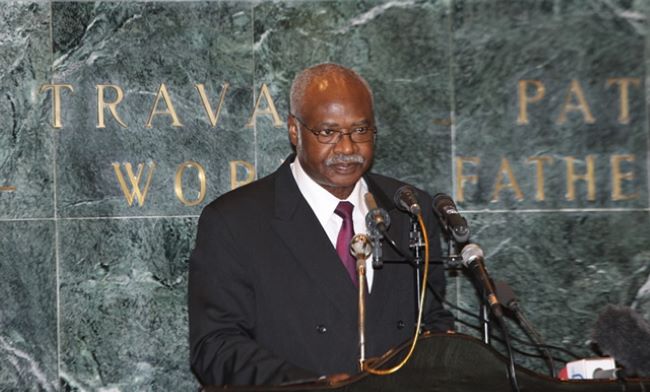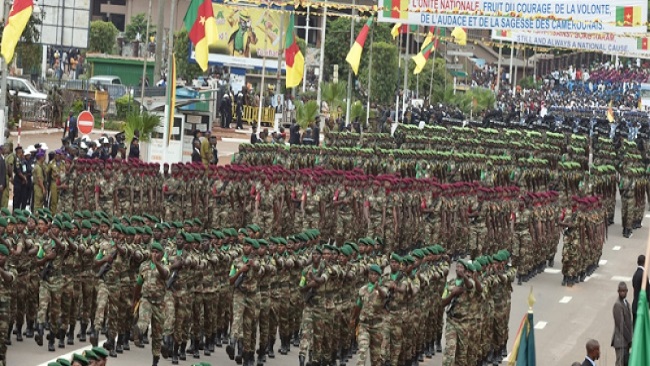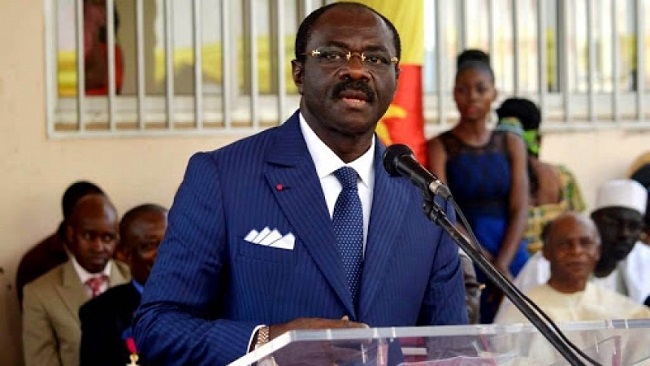7, June 2024
UN General Assembly elects Philémon Yang president of Seventy-Ninth Session 0
Pakistan, Somalia, Panama, Denmark, Greece Elected Non-Permanent Members of Security Council for 2025-2026 Term
In a series of elections today, delegates in the General Assembly chose its President for the seventy-ninth session, the Bureaus of the six Main Committees, as well the five non-permanent members of the Security Council for the next two-year term.
Philémon Yang (Cameroon), who was elected by acclamation to serve as the Assembly’s next President, announced the theme of his presidency: “Unity and diversity for advancing peace, sustainable development and human dignity, everywhere and for all.”
Thanking his predecessors, including the current President, for the “art and science” that each of them deployed during their term’s complex deliberations, he expressed appreciation to all Member States. Highlighting the solidarity of the African Group, he said the African Union spared no effort to achieve the choice of a single continental candidate, while the Central African States endorsed Cameroon very early on at the Economic Community of Central African States Summit. Further, the election is an honour for his country, he said, paying tribute to the wisdom of its President, Paul Biya.
“We are living in very difficult times marked by very striking contrast,” he said, noting conflicts around the world and the unbearable toll on civilians and refugees, “whose numbers are currently reaching a dizzying peak”, including in Gaza and Ukraine. Artificial intelligence is magnifying opportunities and challenges so quickly to the point that “even the most convinced followers of digitalization are calling for rigorous regulation,” he observed. Climate disruptions are posing “a real question of survival”, while the revitalization of the General Assembly and Security Council reform are either halted or moving forward too slowly. And despite global consensus, the 2030 Agenda for Sustainable Development and other agreements on which much hope had been placed are “limping dangerously”, he added.
“In short, the tools at our disposal to promote the well-being of present and future generations are under-utilized while those oriented towards war are over-exploited,” he said. Calling for renewed multilateralism, he highlighted the special role of the Assembly, as the “highest chamber of representation”. It is the most appropriate forum where delegates can express their concerns and aspirations, “the challenges and hopes of the nations of the world”, he said. Exhorting all nations “big and small, rich and poor,” to work together on their common goals, he said sustainable development, shared prosperity and harmony with nature are possible if countries of the world set aside their differences.
Congratulating the President-elect, Assembly President Dennis Francis (Trinidad and Tobago) said Mr. Yang’s “remarkable” career in public life “is testament to a depth of experience and a breadth of vision that are truly exceptional”. As Prime Minister of Cameroon, Chairperson of the African Union’s Panel of Eminent Africans and at the United Nations, Mr. Yang demonstrated “unwavering dedication to the principles of peace, sustainable development and human dignity”, he said. The President-elect’s leadership has also been characterized, he noted, “by a consistent commitment to dialogue, cooperation and inclusivity — principles that are absolutely essential for guiding the General Assembly’s work”.
Underscoring that the Assembly remains a “preeminent and necessary global forum” as the international community navigates multiple complex challenges, he stressed that upholding the principles of multilateralism and international cooperation has never been more vital. “We must work together — and much harder — in solidarity and partnership to address the pressing issues of our time and to ensure that no one is left behind,” he said. Turning to the remaining months of the seventy-eighth session, he urged finalization of the Summit of the Future — “a landmark event that holds the promise of transformative change”. Its success, he added, depends on the active engagement and commitment of all Member States to a genuine effort to find consensus.
António Guterres, United Nations Secretary-General, also offered his congratulations to the President-elect, noting that he arrives at a challenging moment for humanity, amid raging conflicts, deepening climate catastrophe, rife poverty and inequality, and growing mistrust and division. With the Sustainable Development Goals “dramatically off-track”, developing countries are left without the support they need. “A proud African dedicated to the future of his continent,”, Mr. Yang has a wealth of experience representing his country at the highest levels. African countries like Cameroon are bursting with potential, he said, calling on the international community to rally around them and support developing countries worldwide.
“I look forward to working closely with him,” the Secretary-General said, “as he unites Member States around collaborative solutions that can deliver justice to Africa and the developing world.” He also praised Mr. Francis for his diplomatic skill, stewardship and dedication over the past year. “He brought the needs of small island developing States to this Assembly — and so much more,” he said, expressing appreciation for his leadership, including in advancing preparations for the Summit of the Future this September. “At every step, he championed solidarity and brought this Assembly together at a deeply divided and troubled moment in our history,” he said.
The representative of Cameroon, speaking on behalf of the African Group, said it is confident that Mr. Yang — through his academic and professional training, as well as diplomatic and political wisdom — will successfully lead the work of the Assembly’s seventy-ninth session. Above all, his leadership will shine in “debates and decisive actions aiming to improve the destiny of countries in conflict or special situations, many of which are in our planet’s southern hemisphere, especially in Africa,” he added. These countries need unfailing support for the transformation enshrined in the African Union’s Agenda 2063. He urged Member States to support Mr. Yang in achieving his objectives.
Also congratulating the President-elect were the representatives of Yemen on behalf of the Asia-Pacific States, Austria on behalf of the Western European and Other States, and the United States as the host country.
In accordance with tradition, the Secretary-General drew lots to determine which delegation would occupy the first seat in the Assembly Hall during the seventy-eighth session, with all other countries following in English alphabetical order. Yemen was picked for the first seat and this seating order will be observed in the Main Committees.
The Assembly then elected the following Vice-Presidents of its plenary: Algeria, Angola, Austria, Barbados, Ghana, Guatemala, Italy, Kyrgyzstan, Madagascar, Moldova, Senegal, Thailand, Tonga, Turkmenistan and Venezuela. Those elected join the five permanent members of the Security Council — China, France, Russian Federation, United Kingdom and the United States — which serve annually as Assembly Vice-Presidents.
The representative of the United States dissociated from the election of Venezuela as Vice-President.
Following the meeting, consecutive meetings of the Assembly’s six Main Committees were held to elect their respective Bureaus by acclamation.
The First Committee (Disarmament and International Security) elected Maritza Chan Valverde (Costa Rica) as Chair; El Hadj Lehbib Mohamedou (Mauritania), Abdulrahman Abdulaziz Al-Thani (Qatar) and Vivica Munkner (Germany) as Vice-Chairs; and Pēteris Filipsons (Latvia) as Rapporteur.
The Fourth Committee (Special Political and Decolonization) elected Sanita Pavļuta-Deslandes (Latvia) as Chair; Sheikh Jassim Abdulaziz J. A. Al-Thani (Qatar), Carmen Rosa Rios (Bolivia) and Hussein Hirji (Canada) as Vice-Chairs; and Makarabo Moloeli (Lesotho) as Rapporteur.
The Second Committee (Economic and Financial) elected Muhammad Abdul Muhith (Bangladesh) as Chair; David Anyaegbu (Nigeria), Ivana Vejic (Croatia) and Gudrun Thorbjoernsdottir (Iceland) as Vice-Chairs; and Stefany Romero Veiga (Uruguay) as Rapporteur.
The Third Committee (Social, Humanitarian and Cultural) elected Zéphyrin Maniratanga (Burundi) as Chair; Nur Azura Abd Karim (Malaysia), Ekaterine Lortkipanidze (Georgia) and Mayra Lisseth Sorto Rosales (El Salvador) as Vice-Chairs; and Mark Reichwein (Netherlands) as Rapporteur.
The Fifth Committee (Administrative and Budgetary) elected Egriselda Aracely González López (El Salvador) as Chair; Surat Suwannikkha (Thailand), Szymon Mateusz Pekala (Poland) and Johanna Bischof (Austria) as Vice-Chairs; and Elaye-Djibril Yacin Abdillahi (Djibouti) as Rapporteur.
The Sixth Committee (Legal) elected Rui Vinhas (Portugal) as Chair; Ammar Mohammed Mahmoud Mohammed (Sudan), Matúš Košuth (Slovakia) and Ligia Lorena Flores Soto (El Salvador) as Vice-Chairs; and Yong-Ern Nathaniel Khng (Singapore) as Rapporteur.
In the morning, the Assembly in one round of voting elected five non-permanent Council members for two-year terms to replace members whose terms expire on 31 December 2024. They included Pakistan and Somalia to the two seats open for African and Asia-Pacific States; Panama to the single seat open for Latin American and Caribbean States; and Denmark and Greece to two seats open for Western European and other States. Their two-year terms will end on 1 January 2027.
Culled from the UN




























7, June 2024
‘Dictator’ Eto’o and chaos in Cameroonian football 0
Cameroonian football is in a state of chaos.
For a proud country which boasts five continental titles and the most World Cup finals appearances by an African nation, the past two months have seen a very public row play out over who should coach the Indomitable Lions.
Last week Belgian Marc Brys was removed as boss – only to be reappointed within 48 hours.
But the sideshow off the pitch ahead of crunch 2026 World Cup qualifiers is only the tip of the iceberg in a battle for control of the game.
The man now running football in the Central African nation is former Barcelona and Inter Milan striker Samuel Eto’o, a legend of the game on the continent and Cameroon’s record goalscorer, who was elected football federation (Fecafoot) president in December 2021.
But Eto’o has been described as a “dictator” by one former international team-mate because of the way he is steering the organisation – epitomised by the spat with the nation’s Ministry of Sport (Minsep) over Brys.
“Samuel was the biggest player in Africa but there’s a lot of trouble around him,” the retired player, who asked to remain anonymous for fear of a backlash, told BBC Sport Africa.
“He does not listen to advice. When you manage people you do not need to [act] like a dictator.
“I didn’t know he would be like that, and it will be hard for him to continue.”
Players have issued a plea for the team to be kept “politically free” but some fans have become so desperate that they have called on world governing body Fifa to suspend Cameroon.
The curious case of Marc Brys
The arrival of Brys as coach in April, after the departure of Rigobert Song following a last-16 exit at the 2023 Africa Cup of Nations (Afcon), created a storm few would have expected.
Fecafoot expressed its “great surprise” when Minsep announced the appointment of the 62-year-old whose coaching career has been with clubs in Belgium, the Netherlands and Saudi Arabia.
Eto’o’s alternative list of high-profile candidates had reportedly included two-time Afcon-winning coach Herve Renard, Italian World Cup winner Fabio Cannavaro and ex-Nigeria boss Jose Peserio.
“The only problem was the salaries,” Cameroonian sports journalist Giovanni Wanneh told BBC Sport Africa.
“Brys is not the best, but we’re not talking about someone we picked from the gutters. Minsep has played this card before and it worked out fine for Cameroon.”
In Cameroon, as is the case in several other African countries, the government pays the salaries of the national team’s coaching staff and feels entitled to weigh into Fecafoot’s affairs.
Eto’o did not turn up to the presentation where Brys signed his contract on 8 April, and their first in-person meeting on 28 May quickly descended into an unseemly row.
Fecafoot reacted by replacing Brys with an interim coach, only to quickly backtrack after pressure was applied by Minsep.
Yet a tense atmosphere continued this week when the Indomitable Lions squad assembled in Yaounde ahead of the visit of Cape Verde in World Cup qualifying on Saturday.
Players were met by two different sets of administrators at the team hotel, and Fecafoot did not provide kit for the first training session due to be held by Brys – leading forward Moumi Ngamaleu to call for unity.
“The responsibility is for you to help keep the team politically free and to maintain a clean environment for us to perform without problems,” his Instagram message read.
“We hereby approach you to overcome the differences, put the ego aside and remember we are all here to put the people of Cameroon on the map and give them honour.”
Manchester United goalkeeper Andre Onana was among several players who reposted Ngamaleu’s message.
A senior Confederation of African Football (Caf) official said it is open to mediating in the row between Fecafoot and Minsep, although such a request is yet to be received.
‘Grave irregularities’ under Eto’o
Eto’o’s treatment of Brys is only the latest instance of his behaviour garnering negative attention since he assumed control of Fecafoot.
“The fact that you are a top footballer doesn’t automatically make you a great administrator,” said Wanneh.
“When he came in, I thought he was going to change the narrative in our football. But Cameroon football is living its worst moment.”
In July last year, a group representing amateur clubs in Cameroon called on the 43-year-old to resign, citing “grave irregularities” in the organisation.
That included Eto’o taking an ambassadorial role with a sports betting company – potentially in violation of both Fifa and Fecafoot rules.
Moreover, an investigation by Caf into allegations of improper conduct against Eto’o is ongoing.
“He is the legitimate president of the federation. But nobody is above the law,” Caf secretary general Veron Mosengo-Omba told BBC Sport Africa.
A battle for control
In Cameroonian sport, the influence of President Paul Biya has been keenly felt in the past.
He insisted on Roger Milla being included in the squad for the 1990 World Cup – with the then-38-year-old netting four times – while the appointment of Brys’ predecessor Rigobert Song in 2022 was made “on very high instructions” of President Biya.
It is the government financing and pumping in the money,” said Wanneh.
“Fecafoot is not structured in a way that it can cater for its burden and expenditure,” the journalist added. “If it was then we would not have this scenario.”
Countries whose governments interfere in footballing affairs are at risk of suspension by Fifa – a fate that has befallen many African nations in the past, including Cameroon – yet Minsep has so far trodden a path which has not provoked the Zurich-based governing body.
While Fifa’s social media channels have been bombarded by messages to take action, Eto’o retains the backing of many Indomitable Lions supporters in his bid to break free of perceived governmental control.
“Eto’o knows the challenge he’s getting into,” said Heuyo Hubert on the streets of Yaounde.
“I can only wish him good luck because it’s not easy to have Cameroonians who can fight for their rights to be restored nowadays.”
Another fan, Calvin Ngimbond, felt the row with Brys “had its place”.
“There was need for things to be made clear. Marc Brys must align himself with the requirements of the Fecafoot president,” he added.
“We hope things will improve for peace to reign.”
Fecafoot, Minsep and Fifa were all contacted by BBC Sport Africa to comment on recent developments, but none of the parties responded.
World Cup qualifiers now loom large against two sides who out-performed Cameroon at the 2023 Afcon, with a trip to Angola on Tuesday following the tie against Cape Verde.
Brys has already endured a turbulent start to his new job and will be aware the pressure could soon increase.
“Cameroon are no longer the biggest national team in Africa,” the anonymous former international added.
“I am very sad when I look at what’s going on. If they want to be back at the top level, they need to reorganise everything.”
Headlines being made ‘for wrong reasons’
Analysis by Paul Njie, BBC reporter in Cameroon
The ruckus in Cameroonian football is not new, but the way the rift between Fecafoot and the Ministry of Sports has morphed is staggering.
Now, not only are football stakeholders divided, but Indomitable Lions supporters are also at odds over who is right and wrong.
In many ways the row has been seen as a true test of Eto’o’s leadership in a country where government interference in football is almost the norm rather than an exception.
Despite the deluge of allegations against his management and the investigation by Caf over alleged misconduct, the four-time African Player of the Year’s popularity has not waned much. He continues to enjoy widespread love, admiration and support in the country and beyond.
It is unclear how the uproar will end, but there have been growing calls for the country’s President Paul Biya to personally address it once and for all – especially as both rival camps claim to be implementing “high instructions” from him.
Until then, much of the discourse on the streets, in markets, bars, and local media, will continue to be dominated by doubts as to whether the Indomitable Lions will even play their World Cup qualifiers against Cape Verde and Angola.
Cameroonian football is once again making headlines across the world, but for all the wrong reasons.
Source: BBC